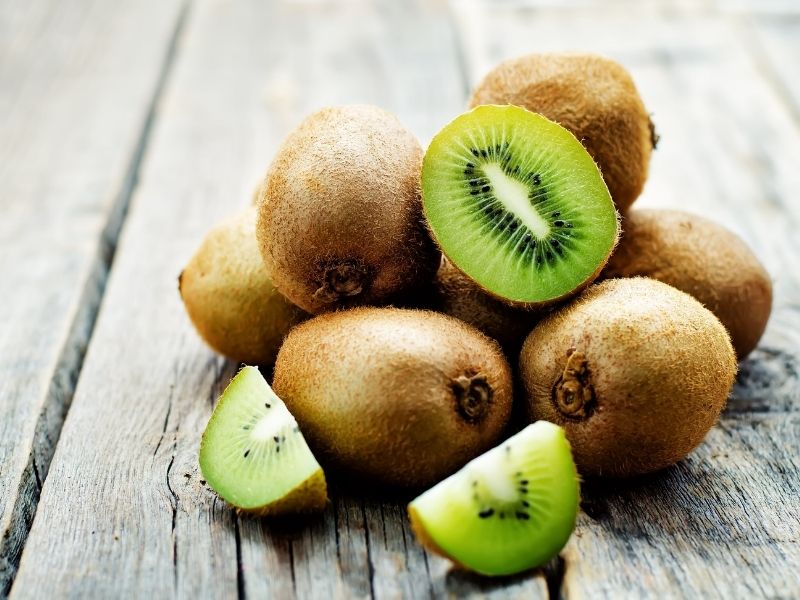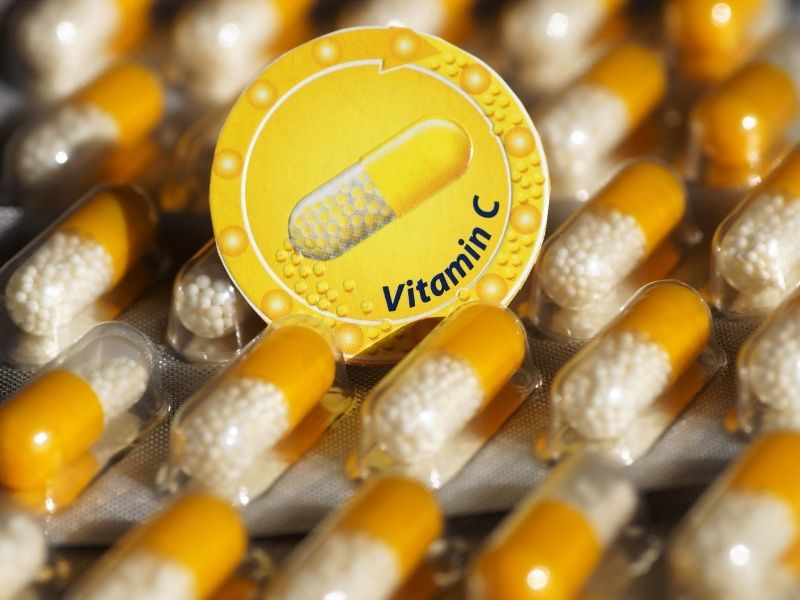Feel you need a little vitamin C in your life?
The best vitamin C supplements should come from natural food sources for the best bio-availability possible.
This also ensures they are free of added chemicals, additives and fillers. After all, supplementation is supposed to be something you do to boost your health, not compromise it even more.
With so many synthetic supplements out there, it really is worth doing your homework before you purchase to ensure you are giving your body the top quality nutrition it deserves.
What is Vitamin C For?
Vitamin C is something that we all need. It is a vital nutrient that acts as a powerful antioxidant. It helps to protect the body from the free radical damage that causes diseases and accelerates the aging process.
Antioxidants are a crucial part of the body’s defense system, and if you don’t get enough of them you simply won’t be firing on all cylinders. This means your immune system may suffer and you will become much more susceptible to illness and disease in the long run.
Foods Containing Vitamin C?

Vitamin C (or ascorbic acid as it’s otherwise known) is found in its highest abundance in fruits and vegetables such as:-
- Kiwis
- Citrus fruits
- Strawberries
- Papaya
- Bell peppers
- Leafy green veg
- Broccoli
- Mange tout
A powerful antioxidant and water soluble, vitamin C helps the body with many of its processes. These include wound healing and the function and maintenance of blood vessels, skin, connective tissues and bone.
Vitamin C And Skin Heath
Vitamin C plays a role when it comes to having youthful glowing skin. This is due to its role in collagen synthesis, making it a POWERFUL anti aging tool.
Studies also suggest it may also play a role in the prevention and treatment of UV induced damage. This is because vitamin C (along with other nutrients) will keep your skin stronger, healthier, and more durable against all types of damage in general.
Take your C alongside other anti aging, antioxidant rich foods and natural collagen aiding rich foods for a double whammy of protection (and not just for noticeable results on the outside either).
Antioxidants (like vitamin C) are also needed to slow the aging process of the whole body (including the brain). They help neutralise free radical damage produced by environmental toxins.
Vitamin C Deficiency Symptoms

Symptoms that show you may not be getting enough vitamin C in your diet include:-
- Lethargy
- Bleeding gums
- Joint and bone pain
- Slow wound healing
- Rough, dry and bumpy skin
- Inflamed and red hair folicles on skin
- Weak bones
- Tiredness
- Bruising very easily
- Weight gain
- Low immune system
Depletion of Vitamin C
As vitamin C is water soluble, it means your body cannot store it and therefore a constant supply is needed. This is why, if you have an illness or a known vitamin C deficiency, you need to be dosing in smaller amounts every couple of hours during the day time.
But, you will need to check doses with your doctor of practitioner under these more extreme circumstances.
Be aware that smoking further depletes vitamin C stores. Therefore, if you’re a smoker you should take extra care to get enough of this vitamin, or best of all GIVE UP!
Also, if you have recently had an operation, you will need more vitamin C than usual for wound healing. This is where it may be wise to take your vitamin C at very high doses temporarily, along with a highly nutrient dense superfood.
How much vitamin C do I need to take?
Between 200-1000mg per day is optimal dosage, depending on your needs. You preferably should take it at intervals throughout the day too, due to it being a water soluble vitamin.
Too much C in one go will just end up being excreted through the urine, so be mindful of this.
Vitamin C from natural sources only is not harmful to the body, as any excess will be secreted in the urine. However, more than 500-1000mg per day could lead to gut problems, such as diarrhea and belly ache. Therefore, you need to find a level that suits you and your own gut tolerance.
The different types of Vitamin C
Although vitamin C is in most fruits and vegetables, it is often destroyed by the heat of the cooking process and in the storage time from picking to plate. All this can make it harder to get an adequate supply into the cells, even with eating fruits and vegetables on a regular basis.
This is where a good quality supplement can be useful. But, be aware that not all vitamin C supplements are created equal, not by a very long shot.
Understanding Vitamin C supplements
Have an understanding of dietary supplements (especially when it comes to vitamin C). And, taking some care with what you choose to buy when it comes to ALL supplements, will work out much more cost effective for you in the long run.
Below is a list of the different types of vitamin C available, what they contain, which ones are the best for health and very importantly, their bio-availability in the body. Remember, if you can’t absorb it, then it will come out when you pee.
The Best Vitamin C Supplements

1. ASCORBIC ACID
The most common and synthetic form of vitamin C is ascorbic acid. This is its chemical name, and it comes in the form of the actual stripped down and isolated molecule. This kind of vitamin C is usually derived from GMO corn and can cause problems when taken in high doses.
There have been certain studies conducted on ascorbic acid that have linked high doses (1000mg+ per day) to genotoxins that can lead to cancer and reduced endurance. These problems are due to its interference with antioxidant enzymes.
Another study found that doses of just 500g a day of this particular kind of C to lead to a higher chance of artery thickening. So probably wise to stay away from this one, especially if you need high doses.
2. SODIUM ASCORBATE
This is sodium bonded with ascorbic acid. Sodium dependent transporters in the body are used to absorb vitamin C, and is the reason why they are paired together in some supplements. But, the downside is they are usually synthetic.
3. CALCIUM ASCORBATE
Calcium ascorbate (or ester C as it is commonly referred to) is supposed to be more gentler on the stomach than the others. Therefore, it may be better for those who have sensitive tummies. It certainly seems like a better option, but it’s still synthetic and so not natural to the body.
4. LIPOSMAL VITAMIN C
This one mixes lecithin with vitamin C, therefore making it fat soluble. This in turn helps increase the C’s absorption. However, usually it is soy lecithin that is bonded with ascorbic acid, so is yet another synthetic vitamin C.
Cons of consuming synthetic vitamin C
The problem with consuming these synthetic versions of vitamin C, is it is very easy to go overboard with them as they often come in such high and totally unnatural doses.
This respected study has evidence there may be a link to men being at higher risk of kidney stones if taking too much vitamin C. And, taking too much is usually only possible with synthetic versions (such as all of the above), so it’s yet another reason to stay away from these particular types.
If you are going to take synthetic C for reasons such as wound healing, illness, or for whatever other reason high doses are needed, then it’s true you may only be able to obtain the high amounts needed in these situations from synthetic C.
The way around this is to take it only in short term bouts, and be sure to take some time off every few weeks, for a few weeks. Or, at least have breaks every couple of months or so. Doing it like this will still give you the benefits of high dose C, but should also help negate any possible side effects.
Natural sources of Vitamin C

Fortunately, there are vitamin C supplements available that are derived directly from food sources, such as berries, rosehips, camu camu and acerola berries are all wonderful, natural high sources.
T natural food sources of vitamin C have the added advantage of containing LOTS of other naturally occurring nutrients from the fruit itself. All of which actually up the absorption of the vitamin C itself.
Mother nature knows what’s best, of course!
This has a lot to do with the fact that good old mother nature usually puts together everything needed in a ‘WHOLE FOOD’ for the highest bio availability and absorption.
Eating a whole food plant based diet contains plenty of foods as close to nature as possible. This will help ensure you get a good array of phytochemicals, nutrients, antioxidants, fiber, AND vitamin C – all naturally!
What are natural vitamin C supplements?

With naturally derived, straight from the source products, you can be sure there are no chemical processes. Also, no added nasties such synthetic sweeteners, fillers, colours, flavours or preservatives that will just add to your toxic load.
It stands to reason that the closer to nature you can get with your supplements, the better they will be received by your body. Thus, the higher their absorption rate.
If you feel like you need some extra vitamin C in your life, then be sure you buy organically derived products STRAIGHT from the plant source.
I use CAMU CAMU as my go to boost in the winter because I find it absorbs well. It is also relatively cheap compared to some other organic products, is gentle on the tummy, and has absolutely NO side effects.
Camu camu, quite interestingly, is a berry that grows on a bush in and around the Amazon rain forests of Peru and Brazil. This is great news, because it means you can be pretty sure it grows wild and hasn’t been tampered with by man.
And, this is the type of 100% nautural vitamin C can also be used long term without risk of serious side effects.
CONCLUSION
Thanks for visiting ZestForever today!
We hope you now have a greater understanding of this all important vitamin and are able to incorporate it safely into your life. If you have any questions or comments then please don’t hesitate to post below.

It is so wonderful to read this article about Vitamin C as this is my personal experience. Vitamin C is good for every skin type and all age groups, and this in not all, it also helps us in the absorption of calcium, so it is not only magical as far as beauty is concerned but also makes our bones and immunity strong. I am so impressed by the way to shared all this information with us. Thank you.
Yes, you are right, it is great for skin and beauty which is why they do add vitamin C to many skin care products and creams. Still, I think it’s probably best to get it from natural sources from the inside. I take camu camu powder as my natural source of vitamin C because it is very gentle on the body and is basically just the powdered plant.
Hi Stefanie, This was a very informative article on vitamin C. I didn’t know that vitamin C can actually harm you by causing kidney stones. I usually load up on vitamin C when I’m sick. Thanks again.
Hi Sam, yes vitamin C is great, but not always in high doses for long term use. Good for a short term immune boost, or if you’re sick, that’s when I find it really useful. I do actually prefer to get my C from natural sources such as kiwi fruits’ oranges, and strawberries, and of course, as mentioned in the post, Camu Camu extract. The closer to nature it is, the better.
Hi, thanks, yes there is more to vitamin C than most people think. It is a very important nutrient and we need to be sure we get enough of it to stay well, especially in winter, so be sure you are getting adequate amounts through your food or supplementation.
Pingback: What Are The Best Anti Aging Supplements? - Top 10 of 2020